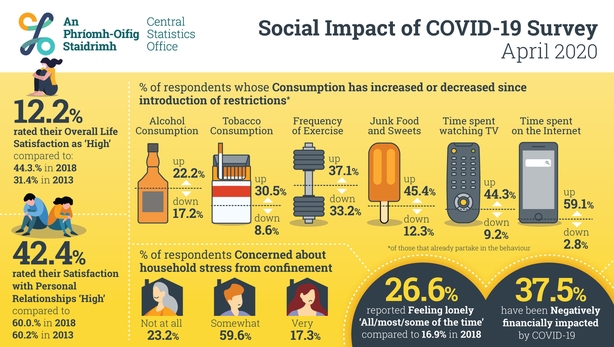The Covid-19 outbreak is having a negative impact on personal relationships and well-being, while it has also led to an increase in the consumption of alcohol.
The findings are contained in a new survey published today by the Central Statistics Office.
The devastating impact of Covid-19 on those who have died and its impact on the economy have been well documented.
But today's survey from the CSO shows for the first time the impact the crisis is having on society.
The percentage of people who described satisfaction with their personal relationships as "high" has fallen from 60% in 2018 to 42% in April.
Over a fifth of men and almost a quarter of women said their consumption of alcohol had increased.
Over 30% of smokers also said they were now smoking more.

The number of people who described their overall life satisfaction as "high" also fell from 44.3% in 2018 to just 12.2%.
Almost a third of respondents reported feeling "downhearted" or "depressed" at some point over the past month.
45% of people surveyed said they had increased their consumption of junk food and sweets. 44.3% said they were watching more television, and 59.1% had increased their time on the internet.
37.5% said they had been negatively financially impacted. That rose to 39% for those who lost their jobs since the onset of Covid-19.
49% of those who lost their jobs during the pandemic rated their life satisfaction as 'low' compared to 27% who were still employed.
When it comes to exercise, 37% said they had increased the frequency with which they exercise compared to 33% who said they now exercise less.
When asked to state their main sources of information about Covid-19, 36% said TV and 27.8% mainstream news websites. 11.1% consulted the websites of the HSE and other Government agencies, while 9.3% stated 'social media'. 8.7% cited radio while just 1.9% said newspapers.






